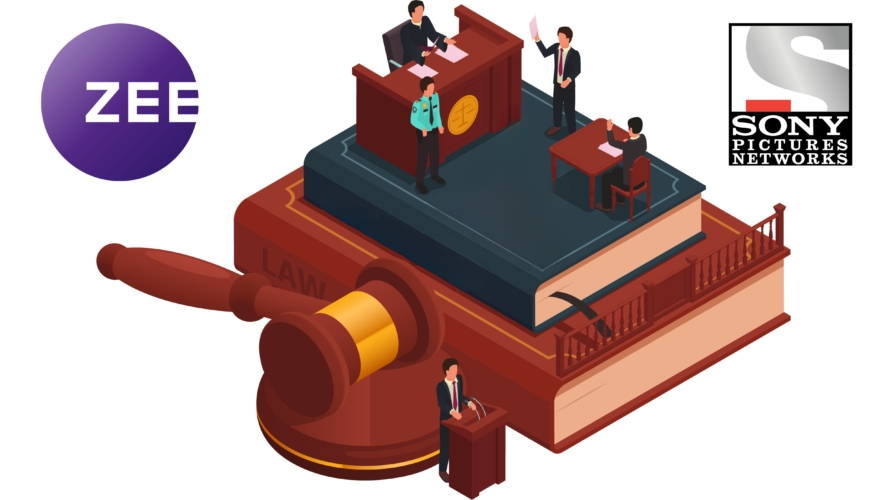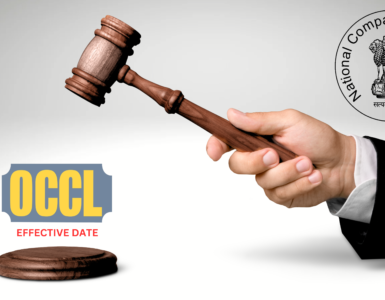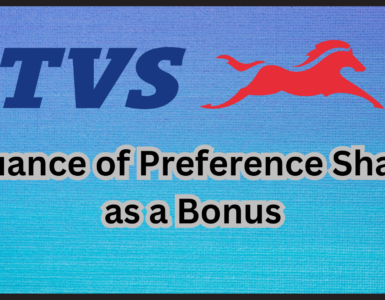After the roller coaster ride, Hon’ble National Company Law Tribunal, Mumbai bench vide its order dated 10th August 2023 has approved the scheme of merger of Zee Entertainment Enterprises Limited (ZEEL) and Bangla Entertainment Private Limited with Culver Max Entertainment Private Limited (earlier known as Sony Pictures Networks India Pvt. Ltd.) filed under Section 230-232 of the Companies Act, 2013 and hereinafter referred as the Zee-Sony Merger.
Lot of financial institutions opposed the Zee-Sony merger, however, Hon’ble NCLT agreed to the view taken by ZEEL of claimants as not being “Creditors” of the ZEEL.
The common grievance of all the above applicants in opposing the scheme were two-fold:
- The first one was regarding a non-compete fee of USD equivalent of ₹1101,30,91,800 (~₹1100 crores) payable by Sony to Zee promoters being bogus & disguised mechanism to cheat lenders & public shareholders of Zee.
- Appointment of Mr. Punit Goenka as Managing Director and CEO for five years upon the scheme coming into effect. SEBI has recently passed an interim order on 12.06.2023 against Mr. Punit Goenka and Mr. Subhash Chandra restraining them from holding any key managerial positions in any listed company or its subsidiary.
Claims by each of the applicants & reply by Zee:
Axis Finance Limited (AFL)
Claims:
- AFL’s claim arises from credit facilities of ₹100 crores given to Cyquator Media Services Limited (Cyquator), an Essel Group entity.
- AFL claims that its basis for filing the objection is that it is a creditor of Essel Group (which includes Zee) and therefore, it is also an unsecured creditor of Zee.
Zee Stand:
- AFL is neither a shareholder nor a creditor of Zee. It has no contractual or legal privity with Zee Therefore, AFL clearly has no locus to object to the Scheme, which is only between the concerned companies and its members.
- In earlier suits filled by AFL before Hon’ble High Court, Zee was never made party.
- AFL has approached multiple courts on the basis of the same cause of action (i.e., to object to and seek deposit of the non-compete fee) and is indulging in forum shopping. In any case, in each of these multiple proceedings, courts have rejected AFL’s claim.
IDBI Trusteeship Services Limited
Claims:
- IDBI Trusteeship is the debenture trustee of 425 debentures issued by Essel Infraprojects Limited (EIL) in favour of certain schemes managed by Franklin Templeton Asset Management (India) Pvt. Ltd.
- Dr. Subhash Chandra had executed a personal guarantee dated 25 June 2019 in favour of IDBI Trusteeship (for the benefit of Franklin Templeton) Guaranteeing the repayment obligations towards the debentures.
- IDBI Trusteeship claims to be a creditor of Dr. Chandra. It has a claim of ₹535,33,97,085 for which it has filed a Commercial Summary before the Hon’ble Bombay High Court against Dr. Chandra.
Zee Stand:
- IDBI Trusteeship is admittedly not a creditor of Zee. It has no contractual or legal privity with Zee. Therefore, it has no locus to object to the present Scheme.
- In the already filled suit, IDBI Trusteeship has admittedly sought similar interim reliefs from the Hon’ble Bombay High Court. Therefore, there is no reason why IDBI Trusteeship should approach two courts seeking the same reliefs.
- IDBI Trusteeship’s entire claim is based on conjectures arising out of newspaper articles. There is not a single document to show that IDBI has any claim against Zee or that the Scheme is fraudulent. So much so that IDBI Trusteeship has not even annexed a copy of the personal guarantee given by Dr. Chandra, on which it is basing its entire objection.
IMAX Corporation
Claims:
- Imax’s claim is based on 3 arbitral awards dated 9 February 2006, 24 August 2007 and 27 March 2008 (Arbitral Awards). The awards are against E-City Entertainment Pvt. Ltd. (E-City Entertainment), aggregating to USD 25 million.
- Zee belongs to the same group of companies, Essel Group, as E-City Entertainment, being under the common control and management of the promoters – so the companies should be treated as one.
- Zee and E-City Entertainment falls within the doctrine of ‘Group Companies’ and should be treated as one concern.
Zee Stand:
- Imax is neither a shareholder nor a creditor of Zee. Admittedly, the Arbitral Awards are not against Zee. Zee was not party to the arbitration agreement, awards, challenge, or enforcement proceedings. Imax, therefore, has no contractual or legal privity with Zee.
- The awards are against a distinct entity. Zee is a board-managed, publicly listed company of which the promoter holds only 3.99 % E-City Entertainment is not even a part of Essel Group as on date.
- In any case, the doctrine is one applied to join parties to an arbitration if the arbitration agreement indicates that they are group companies. Therefore, reliance on the doctrine is completely misplaced.
IDBI Bank Limited
Claims:
- In 2009, IDBI advanced a working capital facility of ₹50 crores (Facility) to Siti Networks Limited (Siti). In 2012, IDBI enhanced the Facility to ₹150 crores.
- Zee had executed a Debt Service Reserve Account Guarantee Agreement dated 3 August 2012 (DSRA Agreement) undertaking to ensure that credit balance of 2 quarter’s interest was maintained in the DSRA and replenished in case of a shortfall.
- IDBI claims that its basis of filing the objection is that it is a creditor of Zee.
- IDBI claimed that as Zee failed to pay its purported debt under the DSRA Agreement, IDBI had initiated insolvency proceedings before the Hon’ble NCLT, against Zee and if Scheme is sanctioned, it will prejudice the insolvency petition as Zee will cease to exist. IDBI argued that the proceedings in the Scheme must await the Insolvency proceedings.
Zee Stand:
- The Hon’ble NCLT, on 19.05.2023, dismissed IDBI’s insolvency petition against ZEE on the ground that the petition is not maintainable pursuant to Section 10A of the IBC.
- Zee did not guarantee the entire outstanding amounts under the Facility it has only obligation to maintain credit balance in the DSRA at all times equivalent to 2 Quarters’ interest payable for the Working Capital Facility.
- Zee has disputed the claim made by IDBI. The position of law is well settled, i.e., a disputed debt cannot form the basis of objecting to a Scheme.
- Even assuming that Zee owes any amount to IDBI under the DSRA Agreement, the present Scheme will not impact the purported liability of Zee. Therefore, the no ground in relation to the DSRA Agreement can be a reason for holding up the Scheme.
JC Flowers Asset Reconstruction Pvt. Ltd:
Claims:
- JCF’s claim arises from credit facilities extended by Yes Bank Limited (Yes Bank) to Essel Infraprojects Limited (EIL) of ₹377 crore crores in 2018.
- On 14 March 2018, Dr. Chandra gave a letter of comfort (LoC) to Yes Bank stating that he will infuse funds in EIL and ensure that EIL pays.
- By an assignment agreement dated 16 December 2022, the loan exposure under the credit facilities given by Yes Bank were assigned to JCF.
- JCF claims that it is a creditor of the Essel Group. But for the scheme, the non-compete fee would have directly been paid to EIL and Dr. Chandra.
Zee Stand:
- Zee has submitted that JCF is admittedly not a creditor of Zee. It has no contractual or legal privity with Zee.
- The fact that the non-compete fee is paid to Essel Mauritius, the promoters of Zee would have full right to compete with the business of the merged entity, which would be to the detriment of the shareholders of the merged entity. Therefore, the payment of the non-compete fee actually protects the shareholders of Zee (who will be shareholders of the merged entity). Further, the non-compete fee has to be necessarily reinvested in the merged entity, thus increasing its capital base, and creating more value for the shareholders.
- The Ld. Securities Appellate Tribunal in Tata Tea Ltd. V. SEBI [Appeal No. 136 of 2008] has held that “…a non-compete agreement would then protect not only the target company but also its continuing shareholders”. Thus, there is no question of the non-compete fee being a device.
- Yes Bank had advanced the facility to EIL based on an independent assessment of EIL’s creditworthiness at a time when the non-compete fee was not even contemplated. Therefore, now JCF must pursue its claim against EIL and not try to stake a wrongful claim in the non-compete fee, which does not belong to EIL.
- The Hon’ble Bombay High Court has held in Yes Bank Limited Vs. Zee Entertainment Enterprises Limited & Ors., that a letter of comfort is not guarantee when the letter simply assures that the issuer will take steps to ensure repayment by the borrower. From the language of the letter of comfort, it is clear that Dr. Chandra did not guarantee that he will pay on behalf of EIL.
- Dr. Chandra is not a shareholder in Zee and none of his assets or legal rights therein are being transferred pursuant to the scheme. Thus, the injunction does not impact the scheme or vice Versa.
- Yes Bank, after having the benefit of reviewing the composite scheme, by letter dated 15 February 2022 gave its unconditional consent to the scheme. This includes the non-compete arrangement.
Hon’ble NCLT Order
- None of the above petitioners are direct creditors of Zee nor have any privity of contract with Zee whose scheme of merger is pending for approval before this bench.
- Claim of JC Flower being the assignee of Yes Bank who has lent credit facilities to Essel InfraProject Ltd. arises out of a letter of comfort given by Dr. Subhash Chandra. Yes Bank in 2021 initiated proceedings before the DRT Delhi against EIL in which Zee is not a party. The Hon’ble Bombay High Court in Yes Bank Ltd. Vs. Zee Entertainment Enterprises Ltd. and others held that a letter of comfort is not a guarantee when the letter simply mentions that issuer will take steps to ensure repayment by the borrower. Further, the bench also mentioned that “it is unable to understand as to how Yes Bank lent such a huge amount to EIL basing on a mere letter of comfort of Dr. Chandra which is not a guarantee as per law. We can understand if such act is done by a layman without knowing the law but not by a financial institution that deals with public money”.
- Bench further observes that the claims of other petitioners also arise from the alleged outstanding dues from other entities of the Essel Group and none of them are the direct lenders of Zee nor do they have any privity of contract with Zee. The only claim of IDBI against Zee is on the basis of DSRA Agreement basing on which IDBI filed Section 7 Petition before the NCLT, Mumbai Bench which was dismissed by NCLT on 19.05.2023 and Zee’s liability in this regard is also in dispute.
- The assets and liabilities of Zee would merge with the new entity and the lenders of Zee will not lose their right to recovery. With regard to the disability of Mr. Punit Goenka in holding any key managerial position in the merged entity due to the interim order dated 12.06.2023 passed by SEBI is concerned, the impugned order passed by SEBI is a very recent one that was passed much after filing the above scheme before the NCLT which cannot be anticipated at the time of approving the scheme by the board and filing before the NCLT. Culver Max Entertainment Private Limited (the transferee Company) has every right to take up this issue at their board level after approval of the scheme depending upon the final outcome of the order of the SEBI for which the present scheme need not be halted on that ground.
The Tribunal also re-affirmed following decision:
- Section 230(4), (proviso), Companies Act, 2013, provides that any objection to an arrangement shall be made only by persons holding not less than 10% of the shareholding or having outstanding debt amounting to not less than 5% of the total outstanding debt.
- Tribunal has very limited jurisdiction in interfering with commercial wisdom of the shareholders in approving the scheme and the NCLT/Company Court can interfere in such commercial wisdom if the objectors could establish that the scheme is unconscionable, illegal, unfair, or unjust to the class of shareholders or creditors for whom it is meant as per the law.
- If liabilities or dues are in dispute and unless those disputes or liabilities are settled, in appropriate Court or forum pending those proceedings, sanction of such Scheme of Arrangement cannot be hauled or stopped or delayed.




